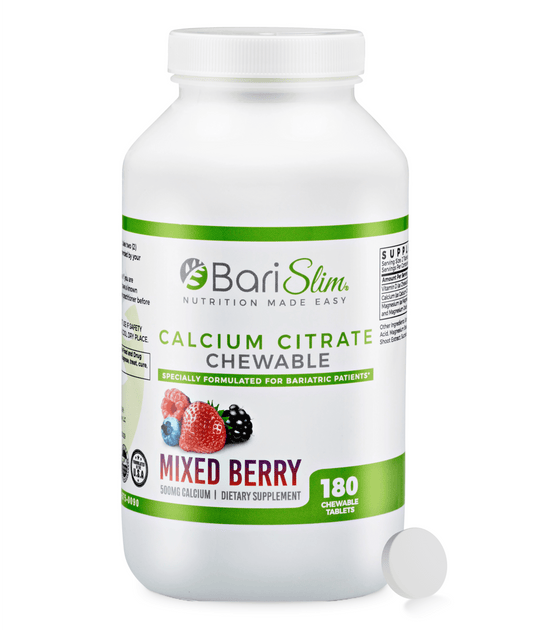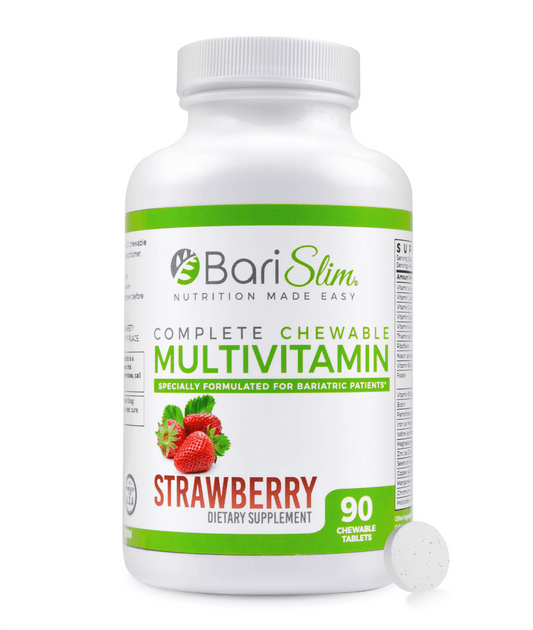Top 11 Common Mineral & Nutrient Deficiencies Following Weight Loss Surgery
Obesity is a common condition, but its causes are complicated, and for many obese patients, resolution of the condition proves unattainable. The rates of growth among the severely obese is steady throughout the United States, and for many patients, weight loss surgery can be a life-saving solution. With this choice, though, patients commit to a new way of life that includes monitoring for nutrient deficiencies that can occur due to the altered anatomy of the GI system.
Weight-Loss Surgeries work through either restrictive or malabsorptive mechanisms, or a combination of the two. Restrictive procedures physically restrict the patient’s ability to intake food, and malabsorptive procedures limit the body’s ability to absorb nutrients and calories from food. Both of these methods can cause deficiencies in the body’s vitamin and nutrient intake.
Vitamin B12
Vitamin B12 is a critical element for metabolism, red blood cell production, and maintenance of the central nervous system. Because post-op bariatric patients have difficulty absorbing this vitamin from protein due to limited stomach acid, supplementation is often essential.
Symptoms of this deficiency include the following:
- Numbness and tingling of the hands and fingers
- Macrocytic anemia
Treatment for Vitamin B12 deficiency involves taking 700-2,000 mcg per week of Vitamin B12 over the course of several weeks.
Thiamin
Thiamin, or Vitamin B1, along with the B complex vitamins serve to promote metabolism, nervous system functioning, and the health of skin, hair, eyes, and the liver. Following bariatric surgery, thiamin deficiency is a distinct possibility, even to the point of development of a disease called beriberi. Early diagnosis is critical, and without treatment, the deficiency can culminate in Wenicke’s encephalopathy.
Symptoms of Thiamin deficiency include:
- Neuropathy
- chronic vomiting
- burning feet sensation.
To treat this deficiency, patients should take B-50 complex vitamins, 300-400 mg of elemental magnesium, 20-30 mg per day or oral thiamin, and 50-100 mg per day of IV-administered thiamin.
Iron
Manufacturing red blood cells, synthesizing DNA, and transporting oxygen and electrons through the body requires iron. Taking Vitamin C and cooking with a cast iron skillet are both effective measures to supplement iron.
Symptoms that a post-op bariatric patient might be iron deficient include:
- cravings for ice, paper, dirt, clay, or cornstarch
- a pale countenance
- otherwise unexplained shortness of breath
- dark under-eye circles
- tiredness
- spoon-shaped nails.
Treatment for iron deficiency requires two multivitamins per day or IV iron infusion.
Vitamins A, E, K, and Zinc
The limitation of the body’s ability to absorb fat contributes to a deficiency of fat-soluble vitamins like vitamins A, E, and K. Zinc promotes a healthy immune system, cell production, and the breakdown of carbohydrates into glucose. Zinc deficiencies can lead to hair loss and a metallic taste sensation. Treatment for these deficiencies requires supplementation.
Folic Acid
A vitamin B vitamin, Folic acid is crucial to red blood cell creation and cellular growth. Post-op bariatric patients should take multivitamins to keep folic acid levels stable.
Symptoms of folic acid deficiency include:
- weakness and tiredness
- headaches
- difficulty with focus
- diarrhea
- palpitations
- a red, painful tongue.
Folic acid supplementation shouldn’t exceed 1 mg per day because it can hide vitamin B12 deficiency. Sufficient folic acid is generally found in one daily multivitamin if it provides 200% of the recommended daily value.
Calcium and Vitamin D
Bariatric surgery can cause calcium and Vitamin D deficiency or make an existing problem worse. Prolonged deficiency can lead to metabolic bone disease, high blood pressure, and diabetes.
After weight-loss surgery, patients should take calcium citrate supplements since it doesn’t require acid for absorption. Patients often also take acid blockers to prevent ulcer development, making an already restricted acid level lower.
Copper
Copper deficiencies lead to anemia and myelopathy, and symptoms include paresthesias and ataxia. Zinc supplementation can deplete the storage of copper within the body, so patients should watch out for zinc supplements that don’t have copper. Patients should choose a multivitamin with 2-4 mg per day of copper.
The Challenges Faced by Bariatric Patients after Surgery
A lack of hunger is often experienced by patients after surgery. Establishing a schedule and lifestyle of healthy eating is necessary for these patients to avoid deficiencies. By setting a reminder alarm on their phones, patients can be reminded to eat and drink according to their new schedules. Patients also need to train themselves to drink water regularly to avoid nausea and dehydration during the initial time after surgery.
Protein is such an important macronutrient, and unfortunately, bariatric patients often fall short of the recommended intake. Protein supplements and shakes are vital parts of the bariatric diet.
Weight loss surgery is such a great tool for the hopelessly obese, but common vitamins often become deficiencies that require remediation. After having bariatric surgery, patients should work with doctors and nutritionists to establish a routine of eating and supplementation.



 Order Free Sample
Order Free Sample





